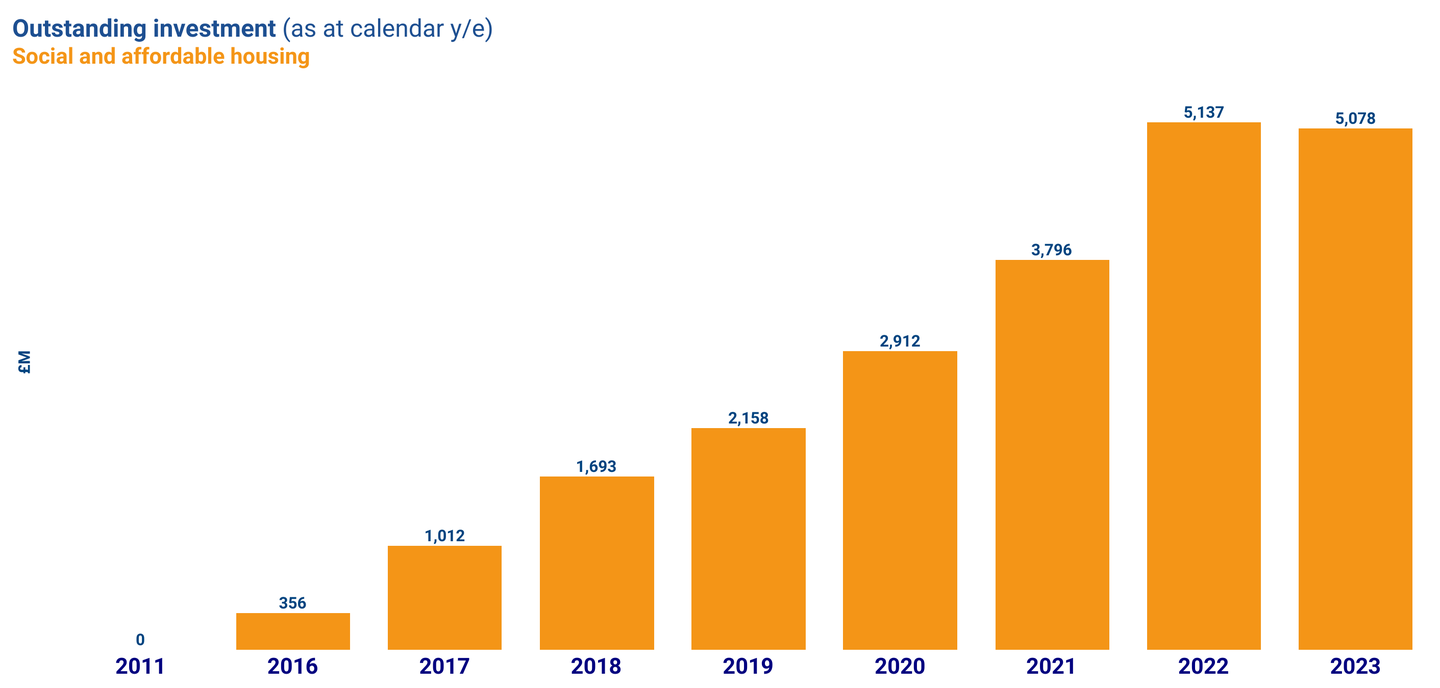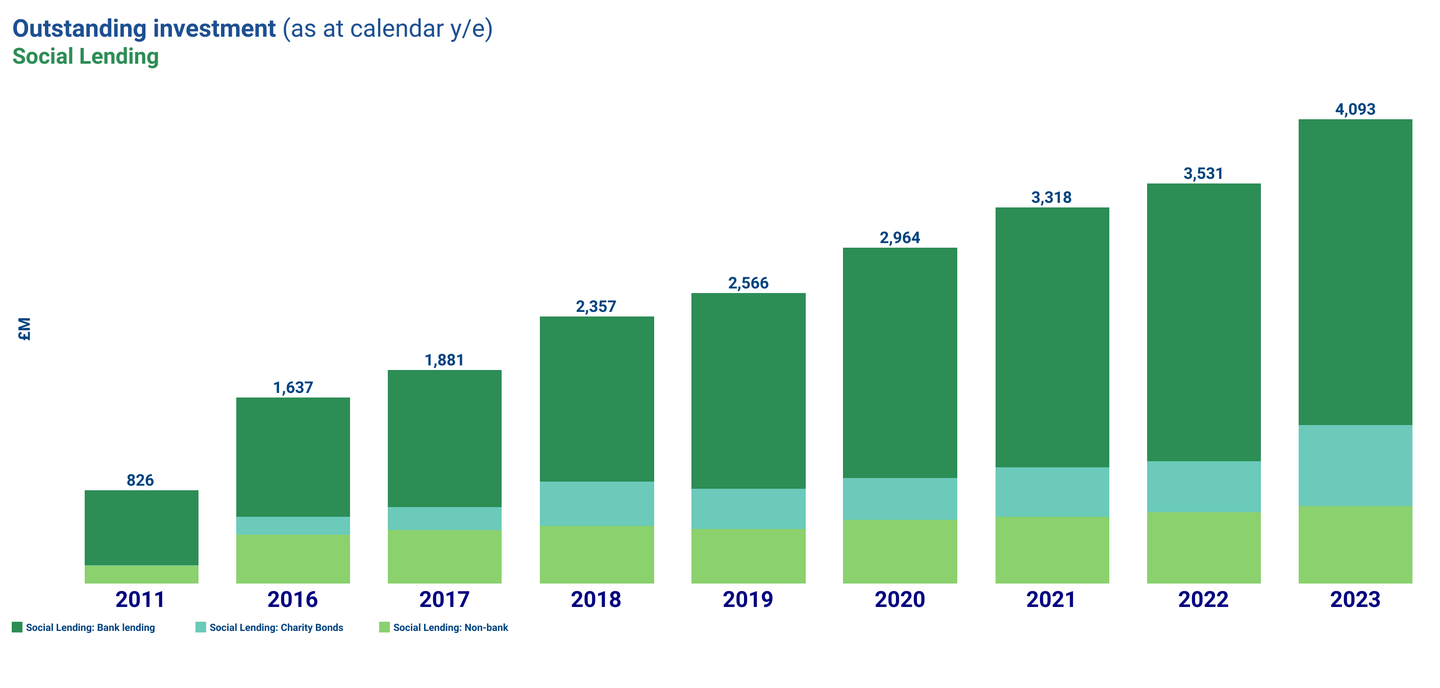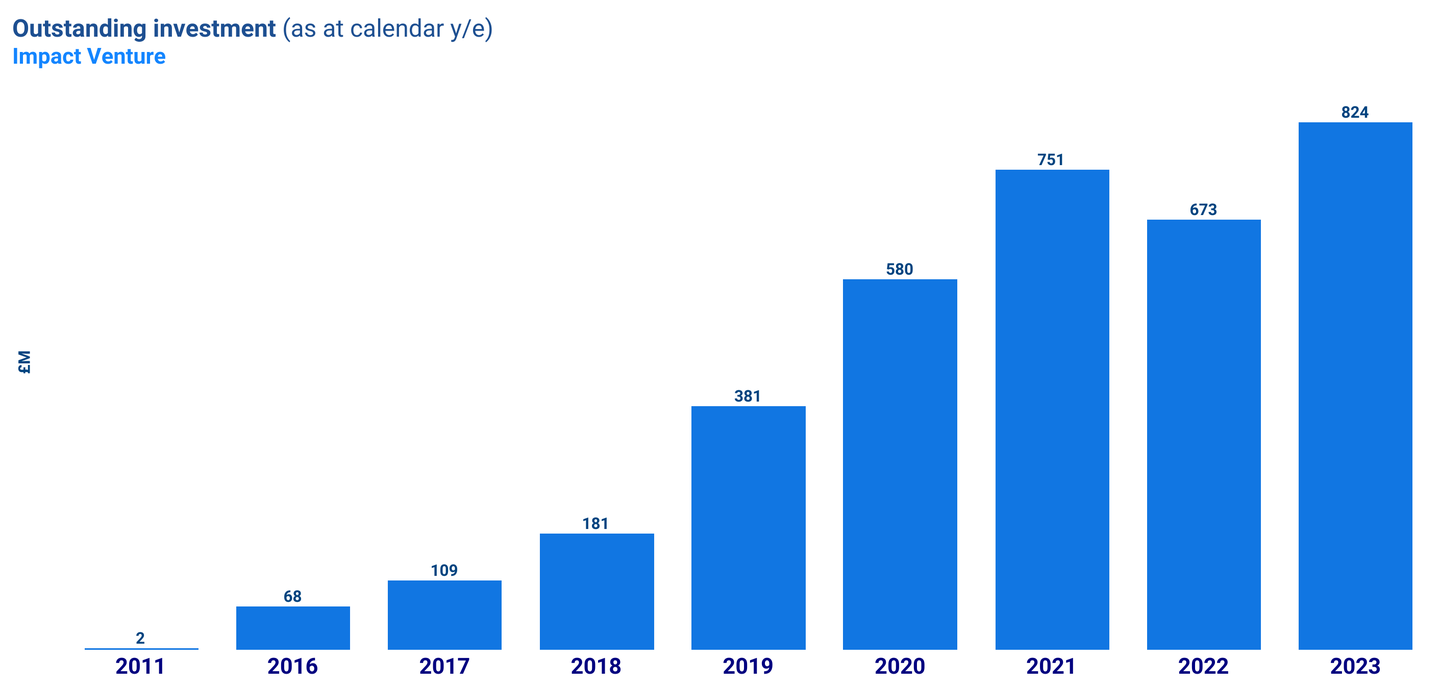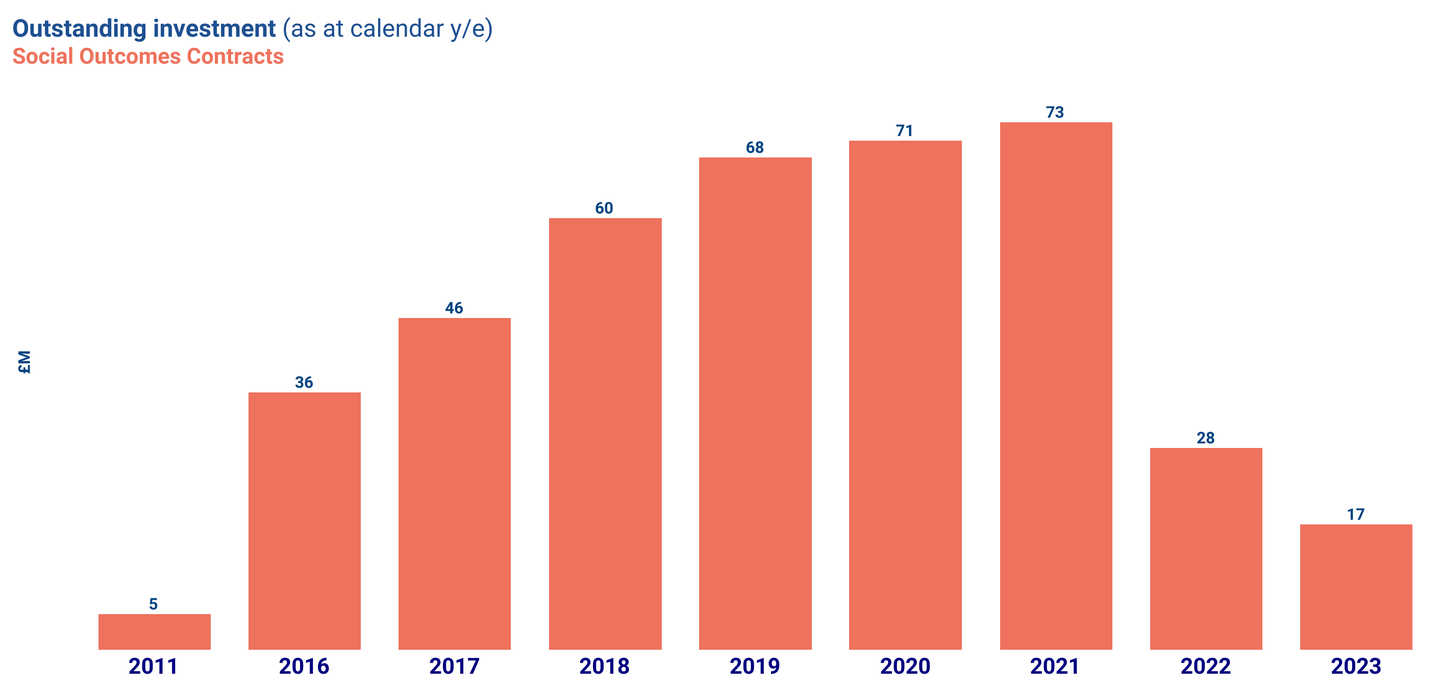Areas of investment
We separate the size of the market into four key investment areas, also known as our ‘market systems’ – Social and affordable housing, Social lending, Impact venture and Social outcomes contracts. Find out more about our market systems approach.
-
Find out more about our market systems approach
Learn more
Social and affordable housing
Social and affordable housing funds account for 51% of the overall 2023 market.
How has the market changed?
Outstanding investment in social and affordable housing has remained relatively stable since 2022 at £5.1bn.
What does the data show?
Although outstanding investment is stable compared to 2022, the value of the funds we have included in both years have increased by 11% and deal flow has increased by 3%. This shows an overall increase in the value of investments and new deployment year on year has been relatively stable. The reason for stable growth overall is due to a consolidation of market participants that meet our impact intent criteria.
We have also included one new fund this year, Henley Secure Income Property Fund, which meets our impact intent definition as set out above: (link to definition set out here in methodology and definitions section). Figures indicate that during the macroeconomic turbulence of recent years, social and affordable housing proved more resilient than other real estate sectors.
Investments from across our own portfolio
- Savills IM Simply Affordable Homes Fund aims to increase availability of affordable homes in the UK.
- Octopus Affordable Housing Fund accelerates the delivery of new, affordable and energy efficient homes for low-income households.
- Resonance Community Developers Fund provides end-to-end financing and wraparound expert support across the different stages of community asset development.
Case study
Notting Hill Genesis
Notting Hill Genesis, as one of the largest housing associations in the country, is dedicated to addressing homelessness and the wider housing crisis by providing quality affordable housing.
Social lending
Social lending accounts for 41% of the overall 2023 market, up from 37% in 2022.
How has the market changed?
Outstanding investment in social lending has increased by 16% since 2022 to ~£4.1 billion in 2023 (£3.5 bn in 2022).
What does the data show?
Outstanding investment across all 3 areas of social lending have increased since 2022:
- Bank Lending refers to loans made to charities and social enterprises by dedicated social banks – this area has shown an increase of 10% in size from £2.5bn to £2.7bn in 2023.
- Non-bank lending refers to debt finance taken on by charities and social enterprises to provide working capital and growth finance. This asset class also includes investments made into community shares and crowdfunding platforms – this area has shown an increase 9% from £627m to £680m in 2023.
- Charity Bonds refer to tradable loans that offer large scale unsecured finance with fewer restrictions than bank finance – this area has shown an increase of 58% from £454m to £719m in 2023
Increases in the market size across social lending are driven by small increases in underlying value of investments from 2022, new inclusions of charitable bonds into housing associations, notably £200m deal flow in 2023 relating to the Scottish Charitable Bond Programme, and 2 new contributors (Ceniarth and People's Postcode Lottery).
An increase in outstanding value across each of the three areas of social lending, especially in non-bank lending, highlights the ongoing resilience from charities and social enterprises. However, the market continues to demonstrate an increased need for blended capital to secure investment across the UK to both broaden geographic reach and attract more private capital alongside public and catalytic investment.
Find out more on our approach to Blended Finance.
Investments from our own portfolio
- CORE – Community owned renewable energy puts renewable energy into community hands to help make places better for people, whilst accelerating the transition to net zero.
- Energy Resilience Fund is aimed at supporting community and social enterprises to reduce energy usage, stabilise energy costs and contribute to long-term Net Zero goals.
- Social Impact Debt Fund IV provides unitranche funding of up to £4m to impactful enterprises with balance sheets to support secured debt.
Where is the investment reaching?
Our enterprise level data lists the transactions made between fund managers and other intermediaries and social purpose organisations from 2002 to 2023. The data identifies the types of organisations using social investment and enables us to understand more about their outcome areas, end-users, business models and geographies.
The latest data (as of December 2023) now captures over 7,000 commitments totalling £3.6 billion of investment into social purpose organisations. The data includes approximately £0.5billion of new commitments made in 2023 into over 700 organisations.
You can find out more about the composition of the market here. This is not a complete set of all social investment activity in the UK, but a voluntary collaborative effort from those across the sector. We are grateful to our partners for their contribution, and we encourage other investors to share their data, demonstrating the impact that social investment is having to front line organisations. To access the open data set and find out more, please get in touch.
Case study
The Children’s Trust
The Children’s Trust provides intensive rehabilitation for children with acquired brain injuries and services for children with neurosdisability.
Impact venture
Impact venture currently accounts for 8% of the overall 2023 market.
How has the market changed?
Outstanding investment in impact venture has increased by 22% since 2022 at £824m (£673m in 2022).
What does the data show?
This year we have included 5 new managers and funds from our Impact VC community which meet our impact intent definition, which has driven much of the growth. Removing the 5 additional new funds, the market growth would be up 3% from 2022.
The market growth from existing funds and contributors reflects a challenging fundraising year however our estimate reflects an increase in venture funds tilting towards impact with the addition of the new contributors. This aligns with broader market commentary around a global slowdown in VC funding as referenced by Dealroom alongside evidence of increased interest in impact with the launch of Impact VC in 2023, a global community of VCs interested in impact, that has grown to >600 firms with >£50bn AUM collectively.
We believe our figure is an estimate of the lower bound of the market, given the challenges in visibility into venture investments that are intentional about the impact they seek and the pace of the market.
Investments from our own portfolio
- Eka Ventures Fund invests in consumer technology companies building a healthier, more sustainable and inclusive economy.
- Fair by Design Fund invests debt and equity in early-stage businesses aiming to eliminate the poverty premium in the UK.
Case study
Flok Health
Flok Health is the UK’s first AI-operated physiotherapy clinic, providing NHS patients with immediate access to personalised care, at population scale.
Social outcomes contracts
Currently accounts for less than 1% of the overall 2023 market.
How has the market changed?
Outstanding investment in SOCs has reduced to £17m in 2023 (£28m in 2022).
What does the data show?
This reduction is due to contracts ending in late 2022 and 2023.
BSC, alongside others, continue to call upon the Government to reallocate budgets to these multi-year outcomes funds. Learnings over the last 13 years have demonstrated the value of social outcomes contracts, enabling Government to spend smarter whilst tackling complex social issues.
Investments from our own portfolio
- Bridges Social Outcomes Funds dedicated to supporting Government-commissioned outcomes contracts.
Case study
Thrive Social Prescribing
Thrive Social Prescribing, or Thrive Northeast Lincolnshire (Thrive.NEL), supports people aged 18-75 with at least one of eleven long-term health conditions (including but not limited to asthma, chronic heart disease, diabetes and hypertension) to create sustainable lifestyle changes and improved self-care habits.



